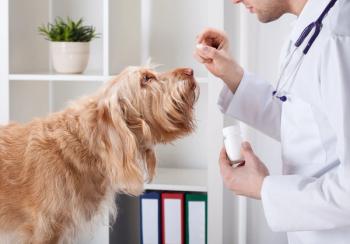
Ohio budget bill impacts veterinary profession
Columbus, Ohio — As Ohio lawmakers haggle over a $51.3-billion budget initiative, several amendments have caught the attention of veterinary leaders in the state.
COLUMBUS, OHIO — As Ohio lawmakers haggle over a $51.3-billion budget initiative, several amendments have caught the attention of veterinary leaders in the state.
House Finance and Appropriations Committee hearings began on the 800-page document at presstime. For starters, the bill, proposed by Gov. Bob Taft, seeks to drop funding for independent regulatory boards and consolidate those related to healthcare under the Ohio Department of Health by 2007.
The plan likely would impact numbers of investigators, personnel, equipment and overhead assigned to the Ohio Veterinary Medical Licensing Board, says Jack Advent, executive director of the Ohio Veterinary Medical Association (OVMA).
"The details are pretty sketchy right now," he says. "From what we can tell, the veterinary board would still exist, but its administrative support would be consolidated. There are a lot of unknowns that we want to know before we formulate an opinion on this. It may have potential problems for public oversight."
DVM Newsbreak
Medical waste addressed
Ohio's noncompliance with a national mandate that all infectious medical waste, regardless of amount, be treated and tagged before removal likely will end with the passage of a budget amendment that mirrors federal law.
State law currently allows small infectious waste generators (those producing less than 50 pounds a month) to throw sharps containers and tissue into solid trash. But the Federal Hazardous Materials Transportation Law, adopted in 2003, pre-empts Ohio's statute. The increased regulations, enforced by the U.S. Department of Transportation, likely will hike disposal costs for veterinarians.
"We are watching this issue closely to gauge the exact nature of its impact on the veterinary community," Advent says. "The difficult part is that Ohio is simply modifying its statute to comply with federal regulations, so there's not a lot of flexibility in how it's amended. Nevertheless we want to make sure the impact is as little as possible."
Loan repayment plan
In an effort to influence the number of rural veterinarians practicing in the state, another amendment might be added soon to the already bulging budget bill.
Rep. Tony Core, chair of the finance subcommittee that hears funding relative to agricultural issues, seeks to add an educational loan-repayment plan for veterinarians who agree to practice in under-served areas of the state for an undetermined number of years.
"The OVMA is pleased state lawmakers are recognizing potential problems in shortfall in veterinary medicine service with a proactive approach," Advent says. "This is an attempt to address nationally reported shortages in this area."
Tax reform
In the area of taxes, veterinarians might receive a break. According to the budget bill, Ohio lawmakers plan to implement a commercial activities tax to replace the existing personal property and corporate franchise taxes currently imposed on businesses.
The goal is to close tax loopholes popular among large companies. A small-business cap of $1 million is associated with the commercial activities tax. Companies that bring in less will pay a flat fee, the bill says.
"From a veterinary medicine standpoint, this could be a very good thing," Advent says. "I think the flat fee will cover most veterinary practices in this state."
Newsletter
From exam room tips to practice management insights, get trusted veterinary news delivered straight to your inbox—subscribe to dvm360.




